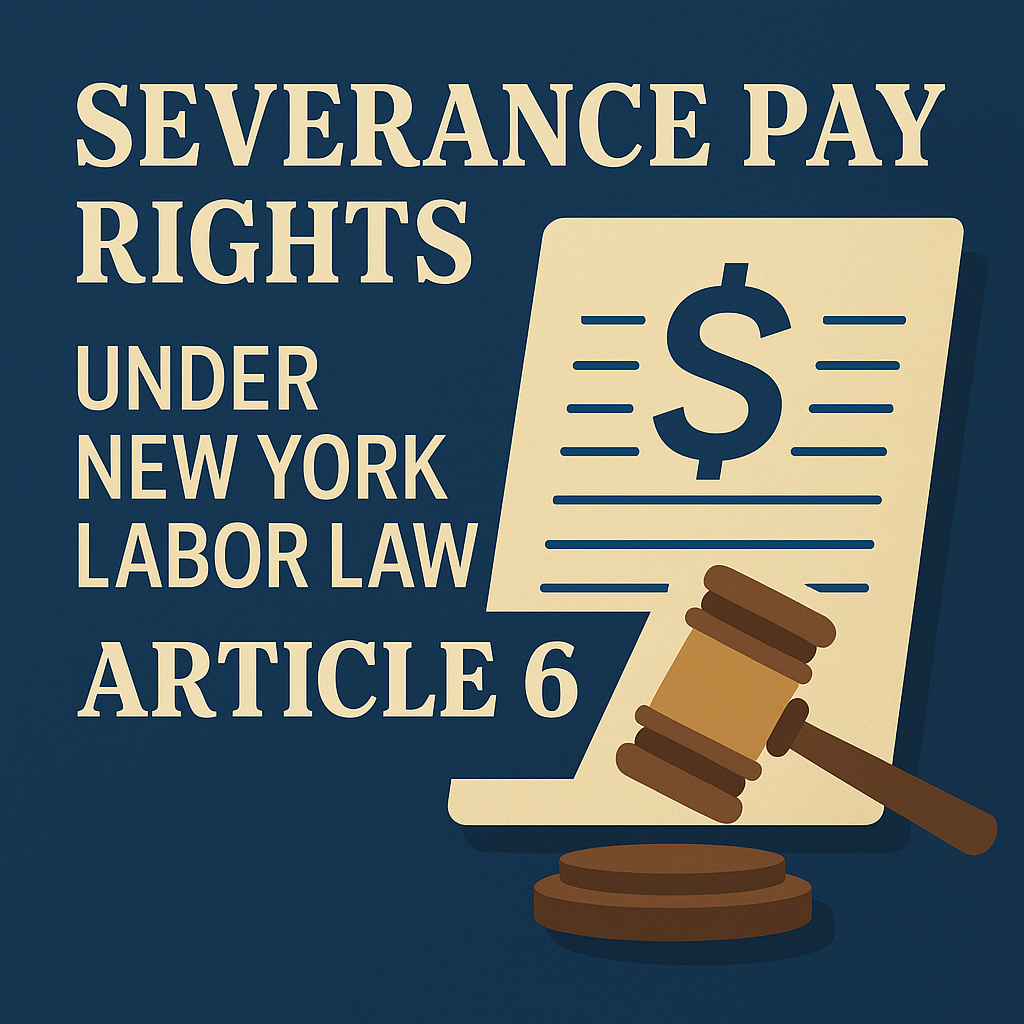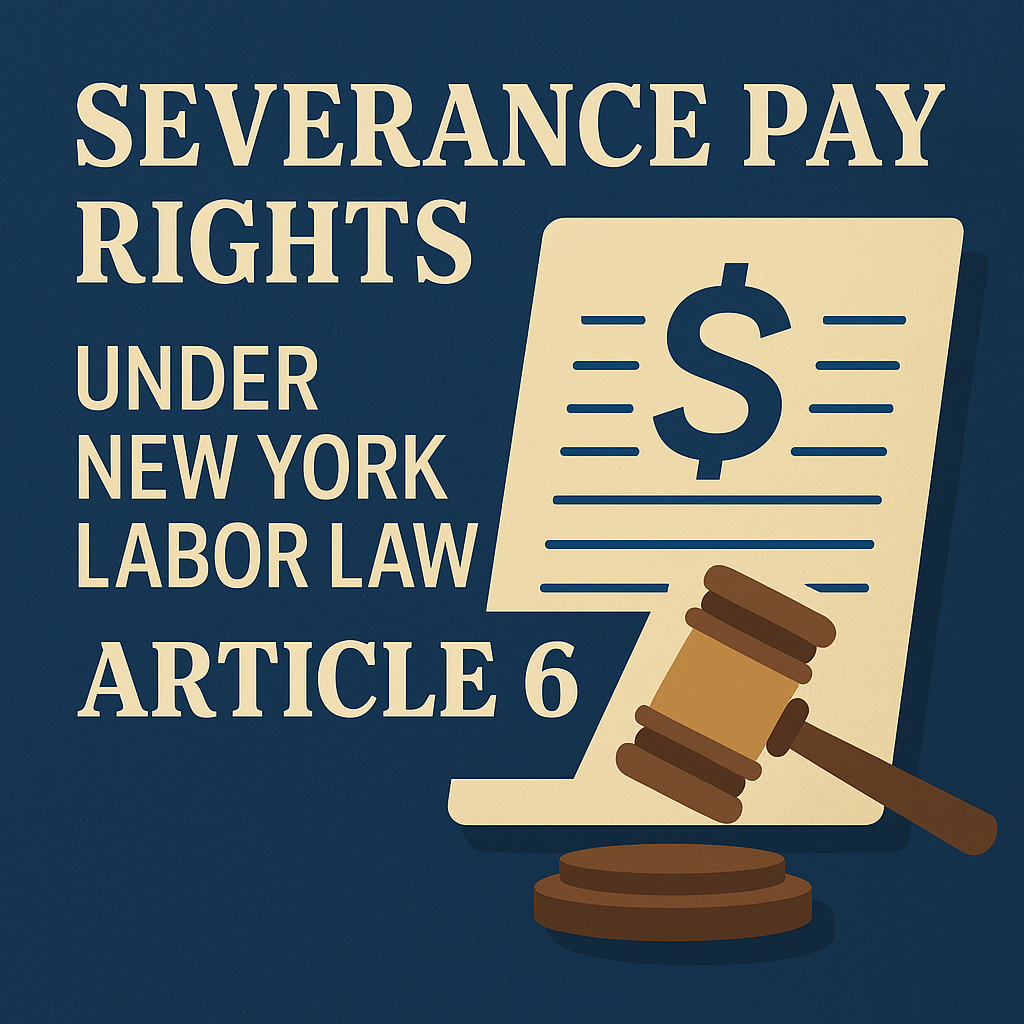 Employees who face the one-two punch of losing their jobs and then being denied their earned severance pay have often had no meaningful chance of recovering their unpaid severance. That’s because many courts had found, in effect, that only modestly paid employees could maintain Article 6 claims for unpaid severance, leaving all other employees with no practical remedy, as the cost of hiring counsel to litigate such cases (a process that can take several years) often exceeds the value of the severance pay itself. Having no practical way to recover earned severance pay makes it difficult or impossible for many employees to meet basic financial obligations, from covering mortgage or rent payments, to keeping up with taxes and insurance, to paying for groceries, medical expenses, or their children’s education. Enter Patel v. Maybank Kim Eng Sec. USA Inc., ___A.D.3d___, 2025 NY Slip Op 05194, *1 (1st Dept. 2025).
Employees who face the one-two punch of losing their jobs and then being denied their earned severance pay have often had no meaningful chance of recovering their unpaid severance. That’s because many courts had found, in effect, that only modestly paid employees could maintain Article 6 claims for unpaid severance, leaving all other employees with no practical remedy, as the cost of hiring counsel to litigate such cases (a process that can take several years) often exceeds the value of the severance pay itself. Having no practical way to recover earned severance pay makes it difficult or impossible for many employees to meet basic financial obligations, from covering mortgage or rent payments, to keeping up with taxes and insurance, to paying for groceries, medical expenses, or their children’s education. Enter Patel v. Maybank Kim Eng Sec. USA Inc., ___A.D.3d___, 2025 NY Slip Op 05194, *1 (1st Dept. 2025).The Patel Case: An Employer’s Failure to Pay Promised Severance Ankit Patel was hired by Maybank Kim Eng Securities USA Inc. When his employment ended in 2022, the company signed a separation agreement promising five months of base salary as severance. Yet Patel allegedly received only three months’ worth, leaving two months unpaid. Patel sued under Labor Law §§ 193 and 198, which provide remedies for employees deprived of their wages or benefits. The trial court dismissed his claim, reasoning that severance is a “wage supplement” and that employees above the statutory threshold could not bring such claims under Labor Law § 198-c.
The Appellate Division’s Answer: No Exceptions to Article 6 Civil Liability On appeal, the Appellate Division, First Department, reversed. The First Department held that nothing in the Labor Law prevents employees above the statutory threshold from seeking civil remedies for unpaid severance under §§ 193 and 198. Key points from the decision: • Sections 193 and 198 contain no exclusion. As the Court of Appeals explained in Pachter v. Bernard Hodes Group, Inc., exclusions found in one section of Article 6 cannot be read into others. Because §§ 193 and 198 contain no such carve-out, they apply to all employees. • 198-c’s exception applies only to criminal liability. Section 198-c imposes criminal penalties for failing to pay wage supplements, but exempts certain executives above a salary threshold. That exemption, however, applies only to criminal liability under § 198-c — not to civil suits under §§ 193 and 198. • The 2021 No Wage Theft Loophole Act. The Legislature emphasized that “[t]here is no exception to liability” for failing to pay wages, benefits, or supplements. The Act simply clarified and reaffirmed what the statutory text already provided: all employees may recover what they are owed, completely and without exception.
Why Patel Matters: Restoring Teeth to Article 6 This decision is significant for both employees and employers. Point Impact Confirms the scope of Article 6 All employees have the right to recover unpaid severance, liquidated damages, and attorney’s fees under §§ 193 and 198. Corrects frequent misreadings Clarifies that courts erred in extending § 198-c’s executive exemption into other sections. Confirms pre-2021 rights The right to recover severance existed before the No Wage Theft Loophole Act; the Act simply clarified and reaffirmed it. Makes claims practical Employees can now recover attorneys’ fees and liquidated damages, making enforcement financially viable. What About Other Departments? Even before the No Wage Theft Loophole Act, the Second Department’s most recent decision on the subject, Gertler v. Davidoff Hutcher & Citron LLP, 186 A.D.3d 801, 808 (2d Dept. 2020), correctly concluded that a plaintiff’s severance wages “fall within the definition of wages as set forth in Labor Law § 190(1),” and that “such wages are protected by the provisions set forth in Labor Law § 193 and fall within the ambit of remedies provided by Labor Law § 198.” Although the Fourth Department in Cohen v. ACM Med. Lab., 265 A.D.2d 839 (4th Dept. 1999), affirmed a decision interpreting § 198-c(3)’s criminal liability exclusion as a bar to Article 6 civil claims, Cohen was decided well before the No Wage Theft Loophole Act was enacted. Moreover, the events at issue occurred even before the 1997 amendment to § 198 added any rights-affirming language. See Cohen v. ACM Med. Lab., 178 Misc. 2d 130, 132 (Sup. Ct. Monroe County 1998), aff’d, 265 A.D.2d 839 (4th Dept. 1999). In light of the Act’s explicit language that “there is no exception to liability” under §§ 193 and 198, Cohen would not likely be decided the same way today. Given Patel’s careful exposition of the law and analysis, it is unlikely that future courts will revive the practice of using § 198-c’s narrow criminal liability exclusion to shield employers from Article 6 civil liability. Takeaways • For employees: Employees can pursue unpaid severance under Article 6, with the ability to recover attorneys’ fees and liquidated damages. • For employers: Severance obligations must be honored. Attempts to rely on § 198-c’s criminal liability exemption to avoid civil liability will fail.
The Bottom Line Patel v. Maybank Kim Eng Securities USA Inc. strongly reaffirms what Article 6 has long guaranteed: all employees, without exception, have the right to recover the full value of their wages, benefits, and severance. Employers who promise severance must pay it — the days of using a criminal liability exception to shelter offending employers from civil liability are over.



